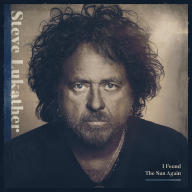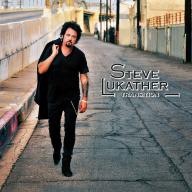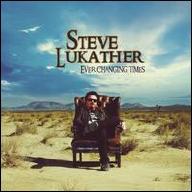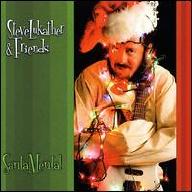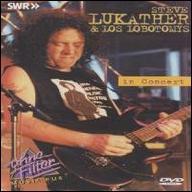Born in Los Angeles, California, on October 21, 1957, Steve Lukather discovered rock music the way just about every American youngster did during the '60s, via the Beatles. When he was seven years old, his father bought him a guitar and a copy of the album Meet the Beatles, and Lukather immediately began teaching himself to play. He became proficient in guitar, keyboards, and drums on his own, and sought out older friends who could teach him new tricks on his guitar. He started taking lessons from musician and educator Jimmy Wyble, and got to know drummer Jeff Porcaro and keyboardist Steve Porcaro, brothers who attended the same high school as Lukather and were already playing professionally. By the time he was 20, he was already playing sessions, and when the Porcaro brothers announced they were forming a band, they invited him to join the lineup. The band was Toto, and they released their self-titled debut album in 1978. It included the hit single "Hold the Line" and the album rose to the Top Ten -- and Lukather officially became a rock star.
While Toto enjoyed almost immediate success, Lukather still found time for session work, and his guitar playing can be heard on albums by Boz Scaggs, the Pointer Sisters, Leo Sayer, Cher, and Alice Cooper. Toto's next two albums, 1979's Hydra and 1981's Turn Back, were only moderately successful, but 1982's Toto IV became one of their greatest successes, featuring two massive hit singles, "Rosanna" and "Africa." Lukather began expanding his role in the group, contributing to the songwriting (he wrote or co-wrote four songs on Toto IV), and adding vocals on the sessions. He and most of his Toto bandmates were recruited to back Michael Jackson on the sessions for his 1982 release Thriller, which became a runaway hit and a cultural phenomenon.
As he continued to play sessions and work with Toto, Lukather became increasingly eager to make music of his own. In 1989, he released his first solo album, Lukather, which included contributions from Eddie Van Halen, Steve Stevens, and Richard Marx. 1989 also saw the release of the first album from Los Lobotomys, a Lukather side project that featured David Garfield, Vinnie Colaiuta, and Will Lee. In 1991, after several personnel changes, Lukather found himself as Toto's lead singer as well as their guitarist; the same year, he guested on The Way In, an album from noted jazz guitarist Jeff Richman. His next solo album, 1994's Candyman, was actually a Los Lobotomys project, released under the group's name in the United States and as a Lukather album abroad. 1997's Luke included two songs co-written by Fee Waybill of the Tubes; he helped write two of the band's biggest hits, "Talk to Ya Later" and "She's a Beauty."
In 1998, Lukather toured Japan with jazz guitarist Larry Carlton, and they brought in an engineer to record one of their performances in Osaka. In 2001, highlights from the show were released on the LP No Substitutions: Live in Osaka, which would earn the guitarists a Grammy award in 2002. 2003's Santamental found Lukather and his friends (who included Steve Vai, Edgar Winter, and Slash) putting a unique spin on a set of Christmas songs. Touring with Toto and Boz Scaggs, along with studio sessions kept him busy, but he found time to cut his fifth solo album, the introspective Ever Changing Times, which arrived in 2008. All's Well That Ends Well followed in 2010, just as his schedule got even busier. Joe Satriani and Steve Vai invited him to join their 2012 G3 Tour, and later that year he was tapped to join Ringo Starr for live dates with his All-Starr Band. The following year, he toured with Ringo, Toto, and Peter Frampton as well as headlining dates of his own, and somehow also found time to finish work on his next album, 2013's Transition. Recording and live work with Toto and frequent touring with Ringo dominated Lukather's schedule for the next several years, yet in 2018 Los Lobotomys treated fans to their third studio album, fittingly titled 3.0, and he gathered a handful of musical friends (among them Greg Bissonnette, David Paich, and John Pierce) to make 2020's I Found the Sun Again, which was recorded live in the studio with no number requiring more than two takes to perfect. ~ Mark Deming, Rovi



